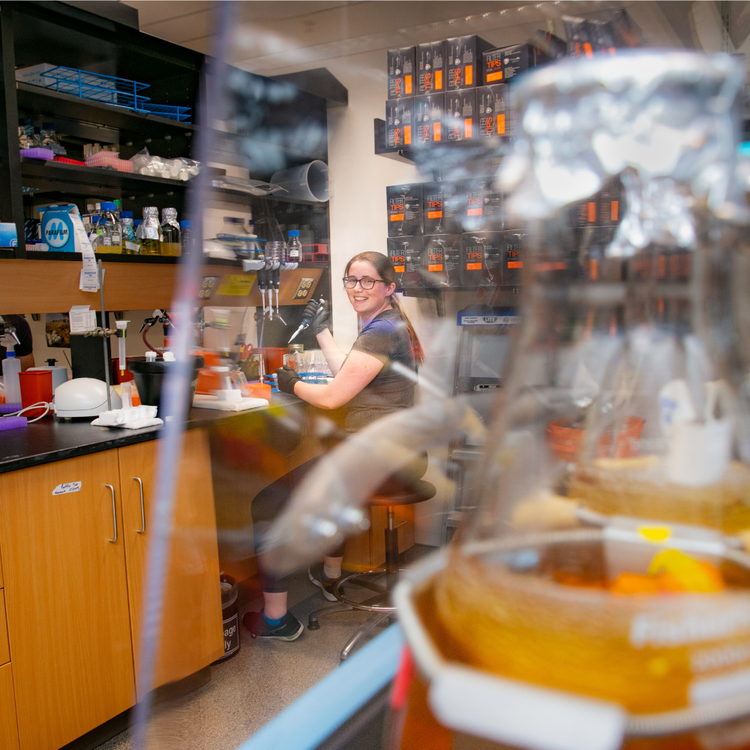
MSc Molecular and Cellular Biology
Students in the Master of Science in Molecular and Cellular Biology program work with faculty engaged in the pursuit of fundamental and applied research questions involving diverse biological systems (plants, humans and other animals, prokaryotic and eukaryotic microbes) at the molecular and cellular level.
Students learn from leading experts in the fields of biochemistry, cell biology, immunology, microbiology, molecular biology and genetics, plant biology, neuroscience, and vaccinology and gain hands-on experience in state-of-the-art facilities for tissue culture, microscopy, genomics, nuclear magnetic resonance, and mass spectrometry.
Students graduate with a high level of knowledge and expertise in contemporary molecular and cellular biology, including experimental techniques, library research, writing and communication skills.
Degree Details
MSc in Molecular and Cellular Biology students complete coursework and prepare and defend a research-based thesis (approximately six semesters). The program is offered in five fields:
- Biochemistry
- Cell Biology
- Microbiology
- Molecular Biology and Genetics
- Plant Biology

Collaborative Specializations
MSc in Molecular and Cellular Biology students may also add a collaborative specialization in Toxicology, Neuroscience or One Health. A collaborative specialization is an intra-university graduate field of study that provides an additional multidisciplinary experience for students enrolled in and completing the degree requirements for MCB graduate program.

Research Strengths
Faculty members in the Department of Molecular and Cellular Biology are nationally and internationally recognized as leaders in their research fields. They include Canada Research Chairs and University Research Chairs, as well as recipients of other national career development awards, and have received many high-profile awards for research and teaching. They carry out well-funded, leading-edge research in fundamental aspects of molecular and cellular biology and address major emerging issues in the areas of cell biology, biochemistry, microbiology, molecular biology and genetics, and neuroscience.
Some of the research strengths within the department include:
- Molecular basis of disease
- Molecular biology and gene expression
- Cell signaling and trafficking
- Host-pathogen/commensal interactions
- Plant metabolism and biotechnology
- Protein structure and function
Career Opportunities:
Graduates of the MSc in Molecular and Cellular Biology program pursue a wide variety of careers in academia, industry (including food and beverage, pharmaceutical, biomedical, and biotechnology industries), and government-sector institutes and laboratories. MSc MCB grads are also well-prepared to continue their education with a PhD or pursue a professional degree.
Our graduates have found careers in:
- Molecular bioscience research
- Medicine
- Pharmaceuticals
- Public health
- Biotechnology
- Science outreach and education
- Food safety and regulation
Hear from MSc in Molecular and Cellular Biology Graduates
Choosing an Advisor
Check out Before You Apply for helpful advice on identifying and reaching out to faculty members.
- Review current graduate student opportunities in the Department of Molecular and Cellular Biology
- Visit our CBS ReSearch database to search by research topic
- Visit the Graduate Calendar for a full list of faculty members who work with graduate students
Meet Some of Our Faculty
To be considered, applicants must have completed a four-year honours undergraduate science degree (or its equivalent) in a relevant discipline. Normally, the applicant must have achieved a B (75%) average or higher during the last two years of full-time study. In exceptional circumstances, students with a B-minus average (70%) will be considered, provided there is strong supporting evidence of research aptitude and potential.
Admission may be granted for entry in September, January, or May. Completed applications should be uploaded at least one full semester (four months) before the expected date of admission (at least eight months for international students).
Applicants must obtain the support of a faculty member willing to serve as thesis advisor before applying. We strongly recommend that potential graduate students contact faculty members who share their research interests before completing and submitting an official application form. Visit Before You Apply for advice on finding and reaching out to a faculty member.
All components of the application, including transcript(s), graduate certificate(s), grading scale(s), language test results, assessment forms, a statement of interest, and the name of the faculty advisor must be uploaded no later than two months after an application is submitted through the OUAC portal. Applications that are incomplete after this time period will be closed.
Visit the Office of Graduate and Postdoctoral Studies page for full application instructions.

Visit Us
Contact individual faculty members by email and/or telephone to arrange a visit. Be prepared to discuss your specific interest in their research program. To assist our faculty in making a selection from the pool of interested students, we suggest you include in your correspondence the following:
- Courses completed (plus the mark received)
- Relevant research and/or work experience you have, and with whom
- Whether you have a scholarship
- Two or three academic or research references
- Reason for contacting our particular faculty
Contact Us
Dr. Rebecca Shapiro
Graduate Program Coordinator
shapiror@uoguelph.ca
519-824-4120 x53390
Jillian Cockwell
Graduate Program Assistant
cbsmcb@uoguelph.ca
519-824-4120 x56246
Karen White
Graduate Admissions Assistant
cbsgrad@uoguelph.ca
519-824-4120 x52730









